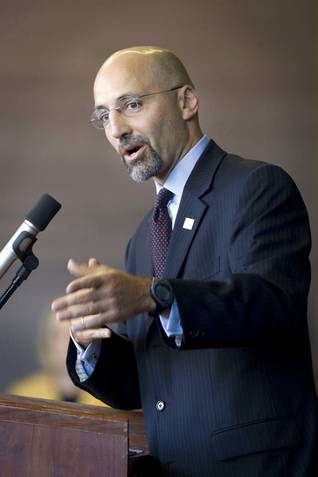
Tiffany Brown / Las Vegas Sun File
Bill Antholis of the Brookings Institution was one of the leaders of the U.S. diplomatic team during the 1997 climate change conference in Kyoto, Japan.
Monday, Nov. 30, 2009 | 2 a.m.
Sun Archives
- Advocating a little pain at pump (11-12-2009)
- Brookings economist: Industries need to bolster their images (10-10-2009)
- More Nevadans will need help as economic storm worsens (9-27-2009)
- Six questions for Robert Lang (9-10-2009)
- The potential for prosperity in Las Vegas (9-9-2009)
- Experts: Despite downturn, Las Vegas has hope (9-8-2009)
- Washington think tank with ideas for the West starts UNLV partnership (9-8-2009)
- UNLV forms partnership with Brookings Institution (9-2-2009)
Beyond the Sun
IF YOU GO
- What: Brookings Institute Managing Director Bill Antholis will speak about “Double-Edged Sovereignty: The Politics and Diplomacy of Climate Change”
- When: 5:30-6:30 p.m. tonight
- Where: UNLV’s Greenspun Hall Auditorium, Maryland Parkway at University Road
- How much: Free
A week from today, dignitaries from across the globe are to meet in Denmark to try to hash out an agreement on reducing carbon emissions and curbing deforestation.
Big climate improvements come with a big price tag and none of the players wants to foot more than its share. But that’s only one of the many reasons why, after more than a decade of negotiations, the world’s leaders have yet to reach agreement on how the planet will put the brakes on global warming. Bill Antholis, an international political philosopher and managing director of the Brookings Institution who is to speak on the subject tonight at UNLV, makes the case that it is the most complicated international political endeavor of all time.
The obstacles to the agreement, he explains, include the long history of colonialism, industrialization, globalization, ideological and cultural differences, as well as the general distrust among so many nations.
Antholis, who spent much of the past week in Las Vegas talking to students and faculty at UNLV, says he wouldn’t put his money on a successful treaty coming out of Copenhagen. But Copenhagen isn’t the final destination, he said. Rather, it is another stop on a longer journey that could take years.
If anyone would know, it’s Antholis, one of the leaders of the U.S. diplomatic team during the 1997 climate change conference in Kyoto, Japan. That conference resulted in a wide-ranging agreement among many nations to reduce greenhouse gas emissions to 1990 levels, but it was rejected by the U.S. Senate and ratified only by the European Union and a few countries.
Things will be different this time around, Antholis says. Domestic climate change legislation has more political support both here and in developing nations. President Barack Obama last week announced he would seek an agreement to reduce greenhouse gas emissions to 17 percent below 2005 levels by 2020.
Antholis said that target is far more fair than the 1990 target agreed upon in Kyoto, which strongly favored European countries.
The trouble today is finding a way to draft an agreement that is acceptable to all the countries involved while still making strides toward reducing greenhouse gas emissions and climate changing deforestation, Antholis said.
There is strong tension going into Copenhagen between developed nations and developing nations such as China and India, which think their economic development should not be stifled by dictates from Europe and the West. Europe and the West don’t want to promise economically difficult emissions cuts that could be rendered meaningless if the developing nations continue to increase their emissions.
At the same time, the United States, China and India are wary of giving up too much control over domestic decisions or promising more than they may be able to deliver.
It would all be simpler if the U.S. passed climate change legislation ahead of the summit. Were domestic legislation already in place, the negotiating team at Copenhagen would have clear parameters of what the U.S. could agree to. Today it has the president’s views, but Congress is another matter, as Antholis learned after Kyoto in 1997.
Congress isn’t expected to pass climate change legislation any time soon, Antholis said. The Senate just pushed through a vote to get the health care debate on the floor. Asking political moderates to do the same again for climate change in such a short time would likely prove futile.
“You can only ask senators to walk the plank so many times,” he says.
The lack of domestic legislation means no concrete agreement is likely to come out of Copenhagen this winter, Antholis said. At best, the nations could reach tentative political agreements that could be taken home for debate and discussion before the group meets again, perhaps in the middle of next year. It could be a year or more before a new agreement is ratified, Antholis says.
“It’s by no means a lock,” he says. “At even odds, I’d take the under on an agreement being signed a year from now. But I know there would be a lot of bettors on the other side.”

Join the Discussion:
Check this out for a full explanation of our conversion to the LiveFyre commenting system and instructions on how to sign up for an account.
Full comments policy